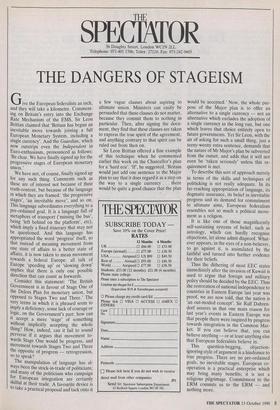THE DANGERS OF STAGEISM
Give the European federalists an inch, and they will take a kilometre. Comment- ing on Britain's entry into the Exchange Rate Mechanism of the EMS, Sir Leon Brittan claimed that 'Britain has begun an inevitable move towards joining a full European Monetary System, including a single currency'. And the Guardian, which now outstrips even the Independent in Euro-enthusiasm, pronounced as follows: `Be clear. We have finally signed up for the progressive stages of European monetary union.'
We have not, of course, finally signed up for any such thing. Comments such as these are of interest not because of their truth-content, but because of the language in which they are framed: 'the progressive stages', 'an inevitable move', and so on.
This language subordinates everything to a pre-ordained goal. It is a language full of metaphors of transport (`missing the bus', being 'left behind on the platform', etc), which imply a fixed itinerary that may not be questioned. And this language has appropriated the word 'progress' itself, so that instead of meaning movement from one state of affairs to a better state of affairs, it is now taken to mean movement towards a federal Europe: all talk of Europe 'speeding up' or 'slowing down' implies that there is only one possible direction that can count as forwards.
Consider this statement: 'The British Government is in favour of Stage One of the Delors Plan for monetary union, but opposed to Stages Two and Three.' The very terms in which it is phrased seem to imply a deficiency, some lack of courage or logic, on the Government's part: how can itaccept a mere 'stage' of something without implicitly accepting the whole thing? How, indeed, can it fail to sound perverse if it argues that movement to- wards Stage One would be progress, and movement towards Stages Two and Three the opposite of progress — retrogression, so to speak?
The manipulation of language has al- ways been the stock-in-trade of politicians; and many of the politicians who campaign for European integration are certainly skilful at their trade. A favourite device is to take a practical proposal and tack onto it a few vague clauses about aspiring to ultimate union. Ministers can easily be persuaded that these clauses do not matter, because they commit them to nothing in particular. Then, after signing the docu- ment, they find that these clauses are taken to express the true spirit of the agreement, and anything contrary to that spirit can be ruled out from then on.
Sir Leon Brittan offered a fine example of this technique when he commented earlier this week on the Chancellor's plan for a 'hard ecu'. 'If , he suggested, 'Britain would just add one sentence to the Major plan to say that it does regard it as a step on the way to a single currency . . . there would be quite a good chance that the plan would be accepted.' Now, the whole pur- pose of the Major plan is to offer an alternative to a single currency — not an alternative which excludes the adoption of a single currency in the long run, but one which leaves that choice entirely open to future governments. Yet Sir Leon, with the air of asking for such a small thing, just a teeny-weeny extra sentence, demands that the nature of Mr Major's plan be subverted from the outset, and adds that it will not even be 'taken seriously' unless this re- quirement is met.
To describe this sort of approach merely in terms of the skills and techniques of politicking is not really adequate. In its far-reaching appropriation of language, its dogmatic assurance, its belief in inevitable progress and its demand for commitment to ultimate aims, European federalism resembles not so much a political move- ment as a religion.
It is like one of those magnificently self-sustaining systems of belief, such as astrology, which can hardly recognise objections, let alone admit disproof. What- ever appears, in the eyes of a non-believer, to go against it, is assimilated by the faithful and turned into further evidence for their beliefs.
Thus the dithering of most EEC states immediately after the invasion of Kuwait is used to argue that foreign and military policy should be decided by the EEC. Thus the restoration of national independence to countries in Eastern Europe last year was proof, we are now told, that the nation is `an out-moded concept'. Sir Ralf Dahren- dorf assures us that one main reason for last year's events in Eastern Europe was that people there were inspired by progress towards integration in the Common Mar- ket. If you can believe that, you can believe anything — or at least anything else that European federalists believe in.
This question-begging, objection- ignoring style of argument is a hindrance to true progress. There are no pre-ordained goals, no inevitable stages. European co- operation is a practical enterprise which may bring many benefits; it is not a religious pilgrimage. Commitment to the ERM commits us to the ERM — and nothing more.


























































 Previous page
Previous page